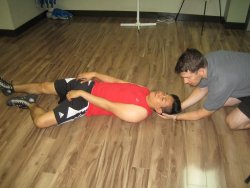Fact Checked
Overview Of Applying First Aid For An Electrical Shock
- What do you do if you think someone has had an electric shock. It might not be clear right away, but if you think somebody is experiencing an electric shock, move towards the casualty with extreme care.
- The initial step is to move the casualty from the electrical source as swiftly as possible. The only way of doing this is to locate the supply source and switch it off, for instance, by unplugging the electrical device or by turning the mains off at the fuse box. If you can’t do this, then try to eliminate the source of electricity from the casualty by using an item, such as a piece of wood.
- NEVER make contact with the casualty that is experiencing the electric shock, or you could experience one too. After you move the casualty from the electrical source or if the casualty is unconscious, phone for an ambulance right away. Only those with the required knowledge should execute first aid.
- When the casualty is awake and seems fine, it is still important to check their condition, as the effects of an electrical shock might not be noticeable immediately. In worst case situations, an electric shock might lead to a condition commonly referred as electroporation, where cells in the body burst, resulting in tissue damage. Other problems may include deep-rooted burns, muscle injury and cracked bones.
What Happens During An Electric Shock?
- Makes you faint;
- Tightening of the muscles;
- Convulsions;
- Lack of moisture in the body;
- Burns;
What to do if you think someone has had an electric shock. It might not be clear right away, but if you think somebody is experiencing an electric shock, move towards the casualty with extreme care. - Fractures;
- Blood clots;
- Narcosis – tissue starts to die;
- Heart or kidney failure; and
- Breathing or problems with the lungs.
Steps To Follow
- Do not try to shift the casualty from the current source.
- The primary step is to turn off the electrical source.
- Otherwise, use a wooden stick to move the source.
- Attend to the casualty.
- Make sure the casualty is breathing.
- If there is no breathing, start performing CPR.
- Phone for an ambulance immediately.
- If the casualty is breathing, carry out a physical examination.
- Take care of slight burns.
- Check all vital signs (breathing, pulse etc.).
- Extreme burns might need surgery.
- Medical assistance must be provided as soon as possible.
Prevention
- Make sure all electrical devices are repaired and working properly.
- Informing people in your home about the hazards of electrical devices.
- Keep electrical appliances far away from kids.
- Learn to value electrical energy as it can be lethal.

